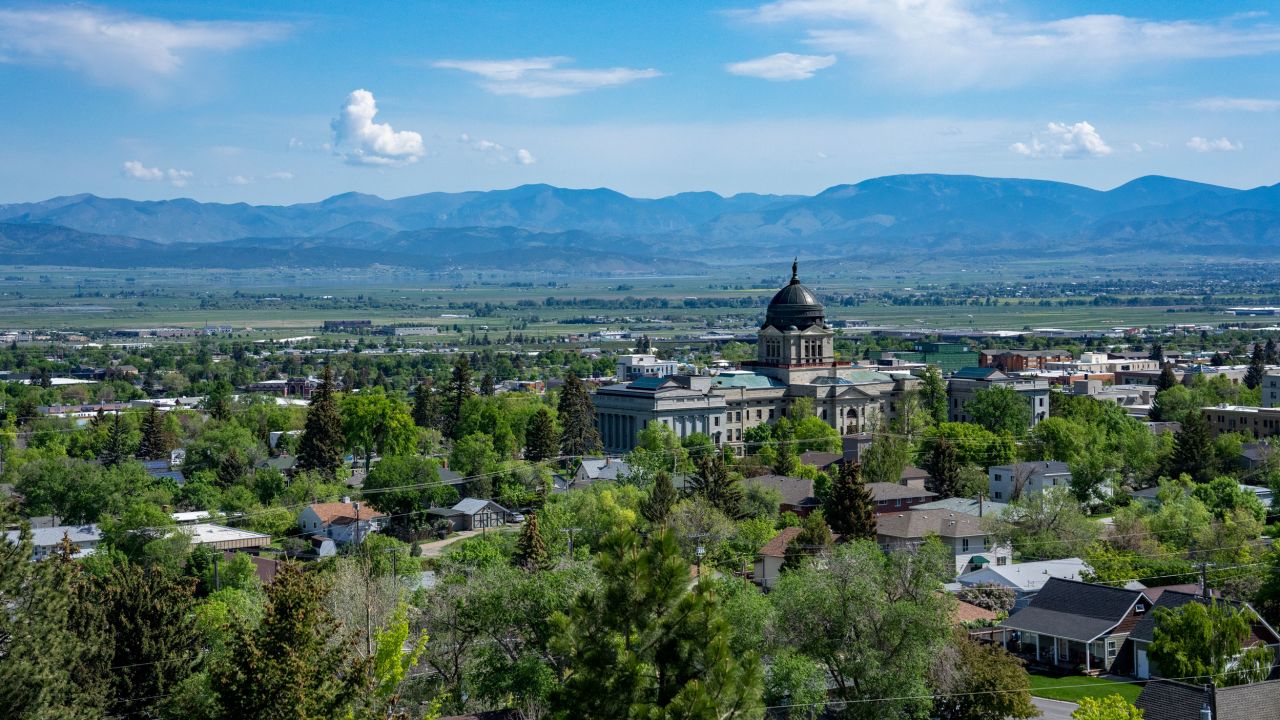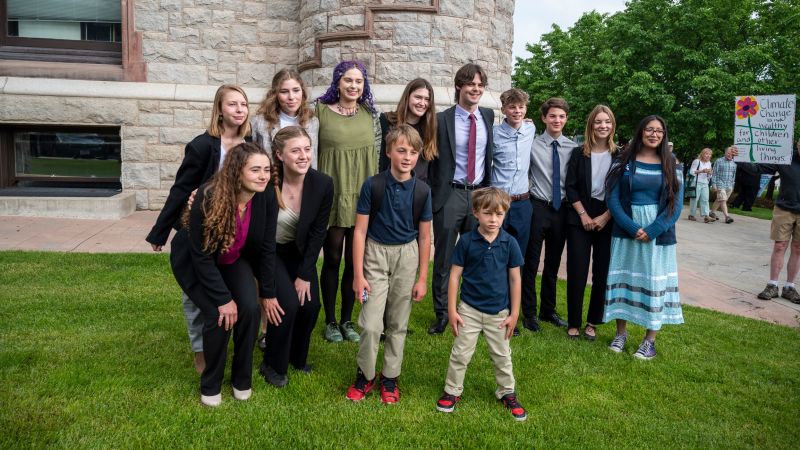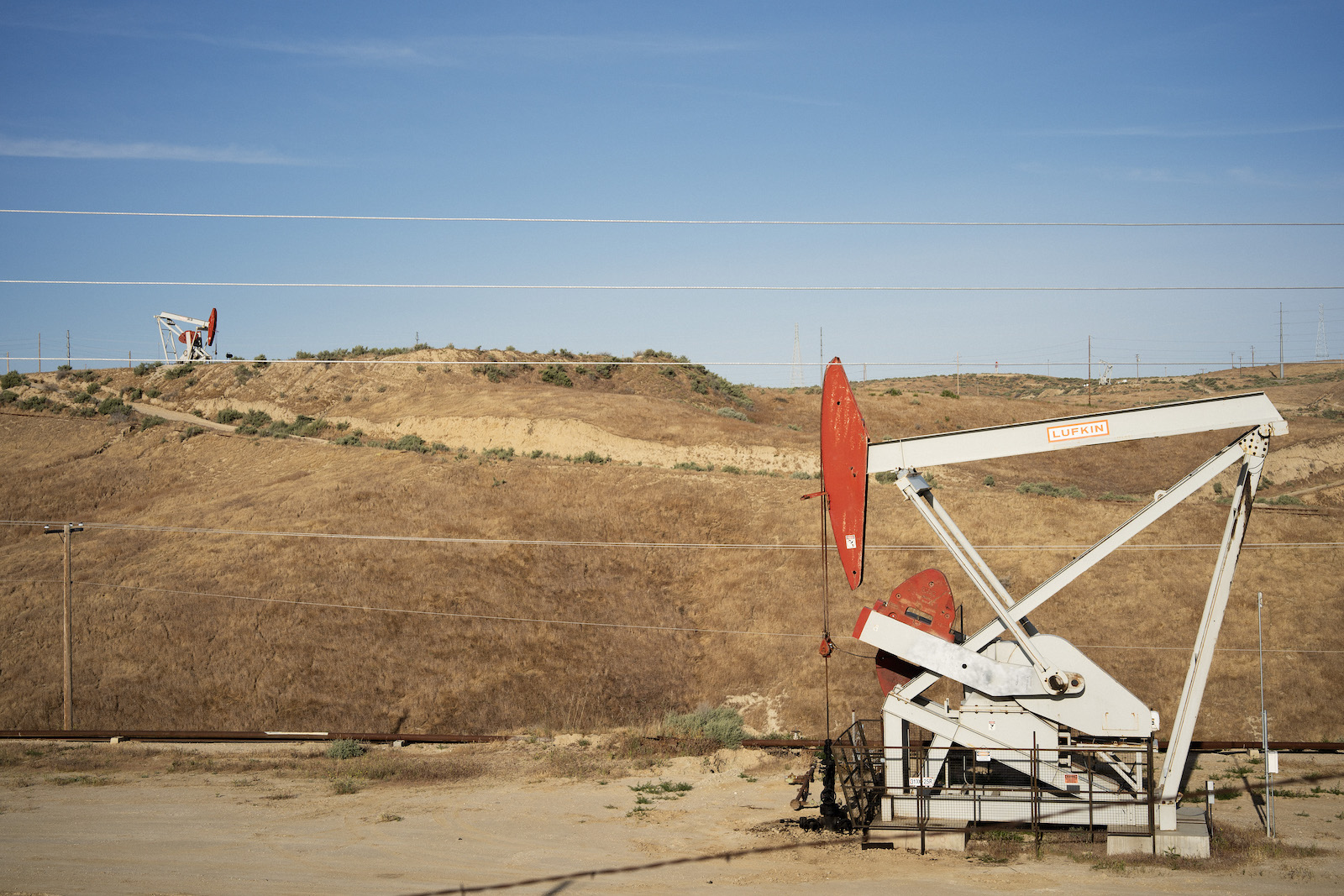Helena, Montana
CNN
—
It’s a Big Sky story fit for a big screen.
On one side: 16 kids from ranches, reservations and tourist boomtowns across Montana – a group of wannabe climate avengers ranging in age from 5 to 22 and assembled to fight for a livable planet.
On the other side: Montana’s governor, attorney general and the Republican supermajorities of both houses, who may have lost a three-year fight to kill the nation’s first constitutional climate case before it hit court, but are still determined to let oil, gas and coal keep flowing for generations.
The setting is a small courtroom in Helena and the whole plot pivots around the Montana constitution, widely considered the greenest in the nation.
“The state and each person shall maintain and improve a clean and healthful environment in Montana for present and future generations,” reads Article 9, and those pivotal words “clean and healthful environment” are also guaranteed separately in the state’s bill of rights.
“This case is about the equal rights of children,” attorney Roger Sullivan began in his opening argument in Held vs. Montana this week, “and their need now for extraordinary protection from the extraordinary dangers of fossil fuel pollution and climate crisis that their state government is exposing them to.”
In the half-century since the environmental promises were added to the constitution, the Treasure State has never rejected a fossil fuel project for potential harm to air or water. And this spring, after a county judge cited the constitution in pulling the permit of a new gas-fired power plant, state leaders quickly crafted House Bill 971 to make it illegal for any state agency to analyze climate impacts when assessing large projects, like power plants, that need environmental review.
In a region full of ranchers and farmers who depend on stable weather and the kind of National Park beauty that draws millions of outdoor enthusiasts a year, the bill created the most buzz by far in the May legislative session, drawing more than 1,000 comments.
But while 95% of the comments were opposed, according to a legislature count, the bill passed.
“Skinny cows and dead cattle,” Rikki Held said, when asked how drought changed her family’s Broadus ranch.
Since she was the only plaintiff of legal age when the suit was filed, the historic case bears her name. Now finally on the stand, she described with emotion what it was like to work through smoke and ash on 110°F days. “We have the technology and knowledge,” said Held, now an environmental science major at Colorado College. “We just need empathy and willingness to do the right thing.”
One after another, her fellow plaintiffs have testified how the effects of a warming planet are already causing them physical, emotional and financial pain. “You know, it’s really scary seeing what you care for disappear right in front of your eyes,” said Sariel, a member of the Confederated Salish and Kootenai Tribes, after describing how the loss of consistent snow affects everything from native plants to tribal traditions.
“Do you believe the state of Montana has a responsibility to protect this land for you?” a lawyer asked Sariel, who, like the other children who were under 18 when the case was filed, is being referred to only by her first name. “Yes, I do,” she replied in a soft voice. “It’s not only written in our constitution, an inherent right to a healthy land and environment, but it’s also just about being a decent person.”
“During the course of this trial, the court will hear lots of emotions,” Montana Assistant Attorney General Michael Russell said in his opening argument. “Lots of assumptions, accusations, speculation, prognostication … including sweeping, dramatic assertions of doom that awaits us all.” But this case is “far more boring,” Russell argued, and is little more than a show trial over statutes “devoid of any regulatory authority.”
Montana’s population of 1.1 million is “simply too minuscule to make any difference in climate change,” Russell told the court, “which is a global issue that effectively relegates Montana’s role to that of a spectator.”
Attorneys for the plaintiffs have tried to poke holes in this argument, pointing out Montana’s outsized energy footprint.
On Thursday, Peter Erickson, a greenhouse gas emissions expert and witness for the plaintiffs, pointed out Montana has the sixth largest per-capita energy-related CO2 emissions in the nation – behind other big energy-producing states like Wyoming, West Virginia and Louisiana.
“It’s significant. It’s disproportionately large, given Montana’s population,” Erickson said.
While attorneys for the state objected when Rikki Held tried to connect her mental health to the climate crisis, they have largely saved cross-examination for the experts as the plaintiffs lay out their case.
“If the judge ordered that we stop using fossil fuels in Montana would it get us to the point where these plaintiffs are no longer being harmed in your opinion?” Mark Stermitz, an attorney for the state, asked Steven Running, professor emeritus of ecosystem and conservation sciences at the University of Montana.
“We can’t tell in advance,” said Running, who shared the Nobel Peace Prize in 2007 as one of the scientists on the Intergovernmental Panel on Climate Change. “Because what has been shown in history over and over and over again is when a significant social movement is needed, it often is started by one or two or three people.”

The trial is set to conclude on June 23 and is being heard before Judge Kathy Seeley, with no jury. While Seeley has no power to shut down fossil fuel use or order the end of new extraction permits, a ruling against Montana could help kill the new law outlawing climate impact analysis and set a powerful precedent for similar cases winding their ways through the courts.
“I think we’re really at a tipping point right now,” Our Children’s Trust attorney Nate Bellinger told CNN. The Oregon-based legal nonprofit has filed similar actions in all 50 states and will go to trial in September with a group of young Hawaiians suing their state’s transportation department, claiming it is allowing rampant tailpipe pollution. The group also supports the 21 young plaintiffs in Juliana vs. United States, who will get their day in federal court after amending their complaint that actions by the federal government have caused climate change and violated their constitutional rights.
When the Ninth Circuit put the Juliana case back on track, 18 Republican-led states – including Montana – tried to intervene as defendants and take on the so-called Climate Kids but were rejected.
It is likely the case will reach the US Supreme Court.
Back in the Wild West days of 1889, Montana’s original constitution was written under the guidance of a copper baron named William Clark, who claimed that arsenic pollution from mining gave the women of Butte “a beautiful complexion.”
But less than a century later, mining and logging had done obvious harm to the rivers, skies and mountainsides of “the last best place,” just as the movements for social change and environmental protection were sweeping the nation.
This was the backdrop when in 1972, 100 Montanans from all walks of life gathered in the town of Last Chance Gulch to hammer out a new constitution with not a single active politician among them. Mae Nan Ellingson was the youngest delegate back then, and as the plaintiffs set out to establish the intent behind “a clean and healthful environment for present and future generations,” she became the first witness in Held vs. Montana.
“It was important, I think, for this constitution to make it clear that citizens could enforce their right to a clean environment and not wait until the pollution or the damage had been done,” she testified.
The Montana Supreme Court agreed with her in a 1999 ruling and the majority wrote, “Our constitution does not require that dead fish float on the surface of our state’s rivers and streams before its farsighted environmental protections can be invoked.”

Regardless of the verdict, it is likely that Held vs. Montana will end up in Montana’s Supreme Court, but for plaintiffs like Claire Vlases who are too young to vote, that will be just fine.
“I just recently graduated high school, but I think that’s something everyone knows is that we have three branches of government for a reason,” she said, sitting by the river that runs through her Bozeman yard. “The judicial branch is there to keep a check on the other two branches. And that’s what we’re doing here.”

































